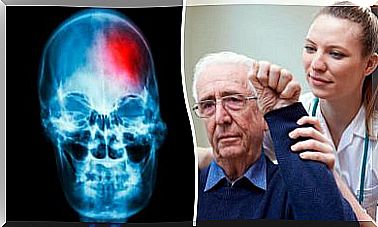7 Complications Of Thyroid Disease

Thyroid diseases cause a wide variety of symptoms and complications that often have a serious impact on a patient’s quality of life.
Thyroid disorders are definitely one of the most common diseases that affect women in particular. Although there is treatment for thyroid disorders, they usually involve considerably long processes, including chronic treatments, that may require surgery.
This butterfly-shaped gland affects innumerable metabolic processes. Any kind of hormone deficiency or excessive secretion can lead to changes that can be confused with other diseases. It is for this reason that it is quite common for a patient to feel tired without knowing why, or for him to associate weight gain with stress.
Many diseases do not cause as many different types of complications as thyroid disorders, so you should be aware of them for your own health and well-being.
Today we look at some of the most common symptoms of thyroid disease.
1. Constipation, indigestion or irritable bowel

Thyroid diseases can cause a wide variety of changes in the digestive system.
Before being diagnosed, it is normal to suffer from digestive problems and even an irritable bowel from time to time.
On the other hand, symptoms can help determine what type of thyroid problem it is:
- Hypothyroidism:
- Constipation
- Poor absorption of nutrients
- Indigestion
- Hyperthyroidism
- Diarrhea
- Stomach ache
- Abdominal swelling
- Occasional vomiting
2. Menstrual disorders and possible infertility
Irregular menstrual cycles are common in patients with thyroid problems.
- In hypothyroidism, menstrual cycles are usually longer and more painful.
- In contrast, women with hyperthyroidism usually have shorter and more frequent periods, or, more annoyingly, early menopause.
This is definitely one of the more serious consequences of thyroid disorders. However, it usually occurs only in women who have not been diagnosed in time or who are not receiving effective treatment.
3. Muscle and joint problems

This is one of the most common thyroid problems, but also one of the least known. It is important to be aware of the following:
- People with hypothyroidism, regardless of age or gender, usually suffer from persistent muscle and joint pain. It is a symptom that burdens them so much that it can lead to a misdiagnosis of fibromyalgia, for example. However, treatment significantly reduces this symptom. On the other hand, patients with thyroid problems often develop carpal tunnel syndrome or plantar fasciitis.
- People with hyperthyroidism usually feel pain or weakness in their arms or legs.
4. High cholesterol
Here is another symptom that may come as a surprise to some people. Thyroid problems can cause bad cholesterol, LDL, to become more resistant to treatment.
- This is common in certain patients who fail to lower their cholesterol levels despite diet, exercise, or even statins. When this happens, it is usually a hypothyroidism.
- On the other hand, very low cholesterol levels (which is not necessarily a good thing) can be a sign of hyperthyroidism.
5. Changes in sleep patterns as a result of thyroid disorders

One of the consequences of thyroid disease that most affects quality of life is difficulty sleeping. However, these disorders usually do not affect the amount of sleep, but rather in the following ways:
- Sometimes patients wake up tired and weak after sleeping up to 10 hours the night before.
- Sometimes the feeling of insufficient rest results in patients sleeping through naps or throughout the weekend. This is a very serious problem.
In some cases, a person may have difficulty falling asleep due to tachycardia or increased nervousness or anxiety.
6. Changes in the skin
In addition to hair loss, it is normal to experience significant changes in the skin.
- The skin may appear rougher, drier and more flaky, especially in the ankles, knees and elbows. These problems are related to hypothyroidism.
- On the other hand, in hyperthyroidism, the skin can become more fragile and very sensitive to temperature changes.
7. Depression and anxiety

Hypothyroidism is due to a less active thyroid gland, which can lead to changes in brain neurotransmitters. Decreased serotonin or dopamine levels can cause depression.
On the other hand, a patient with depression for whom psychiatric drugs are not effective is likely to suffer from thyroid problems.
This indicates that thyroid diseases can manifest as mood problems, lack of nocturnal rest, or joint pain when a diagnosis has not yet been made or treatment is not effective.
Keep these symptoms in mind.









